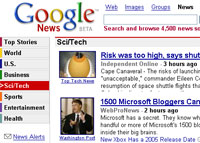 Google is busily hatching plans to dramatically improve the results of internet news searches by introducing a system that ranks articles by quality rather than just their date and relevance to search terms.
Google is busily hatching plans to dramatically improve the results of internet news searches by introducing a system that ranks articles by quality rather than just their date and relevance to search terms.
Currently, typing something like ‘Iraq’ into Google, will generate zillions of “hits”, ranked in order of relevance or by date, so that the most recent or most focused appear at the top of a monster list.
The problem with this approach is that news stories from more authoritative sources – say the CNN or the BBC – can be knocked off the first page of results because they are not as recent or as relevant to the keywords typed into the search box.
Google hopes to address this problem by building a smartypants database that will compare the track record and credibility of global news sources and adjust the ranking of any search results accordingly.
The database will do its thang by continually monitoring the number of stories from all news sources while making a note of average story length, number with bylines, the number of the news agencies cited, along with how long they have been in business.
And there’s more! Google’s database will also record the number of staff a news source employs, monitor the volume of internet traffic to its website and check its international appeal by counting the number of countries accessing the site.
A big box stuffed full of levers and blinking lights will then absorb all these parameters, weigh them according to a clever-clogs formulae it is constructing, and then distil them down to create a single value.
We like to think that this number – then used to rank the results of any news search – is noisily outputted on a long string of ticker tape, but we might be getting a bit carried away.
Google’s ambitious system was unveiled by patents filed in the US and around the world in 2003 which revealed that the same methodology could be employed to rank other search results, such as sales and services.
Campaigners and activists may not welcome this news though, as Google’s proposed system suggests that it will be harder for independent, non-mainstream news sites to appear in the top rankings.
One of the beauties of the web is that of you type in the name of the uber-corporates Nestle into Google, the Nestlé boycott campaign appears on the first page of results.
I wouldn’t like that to change.